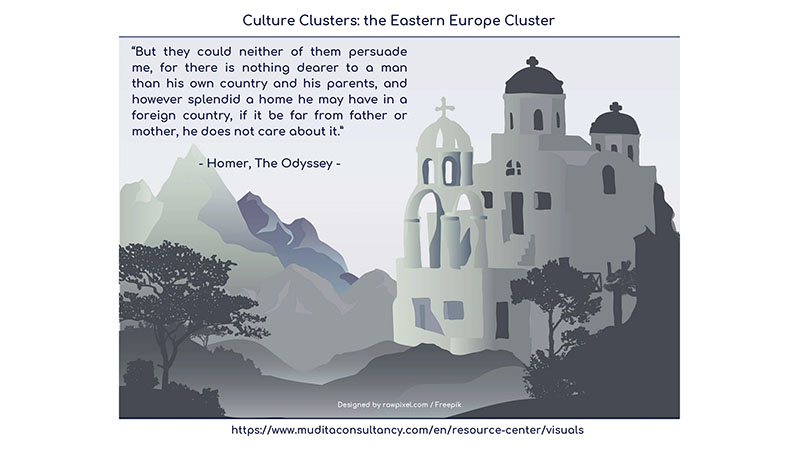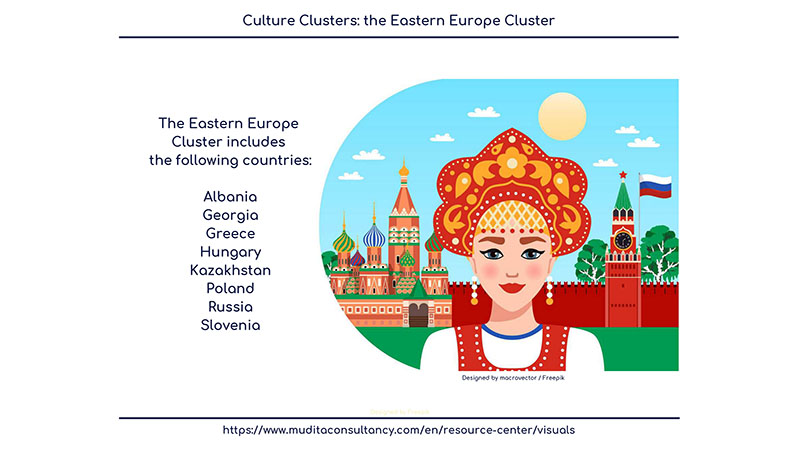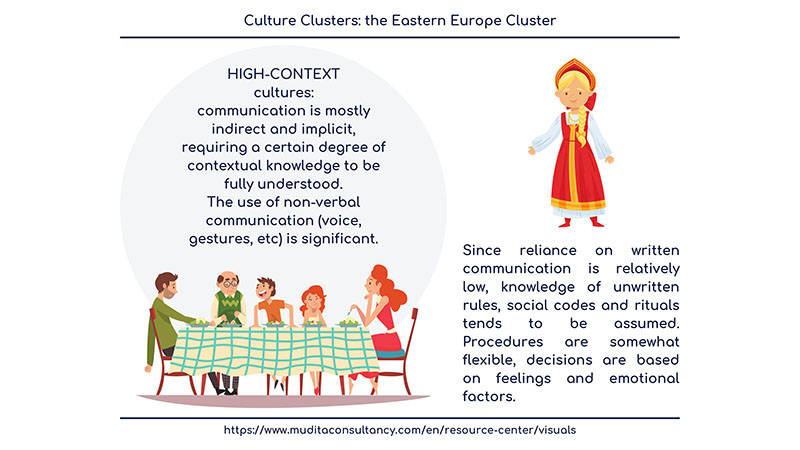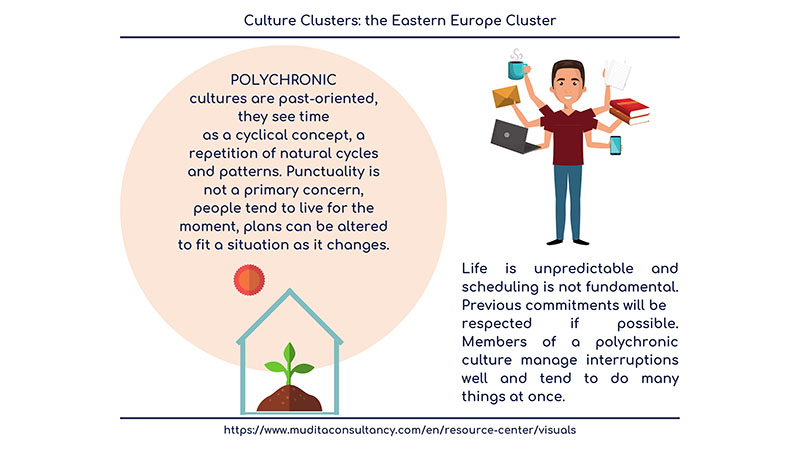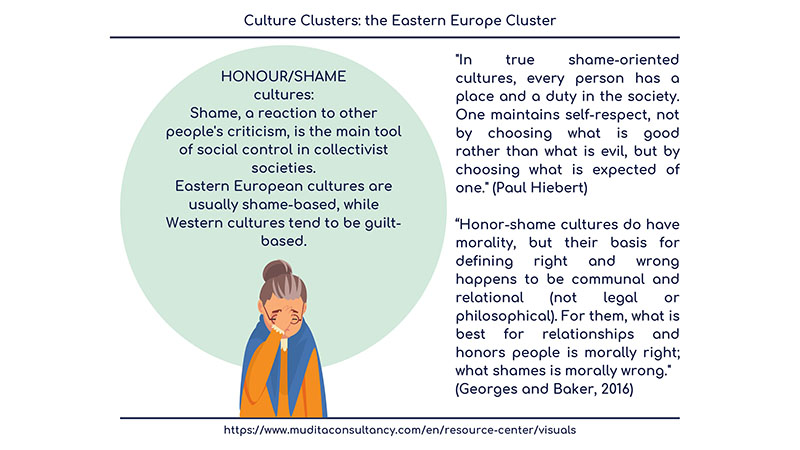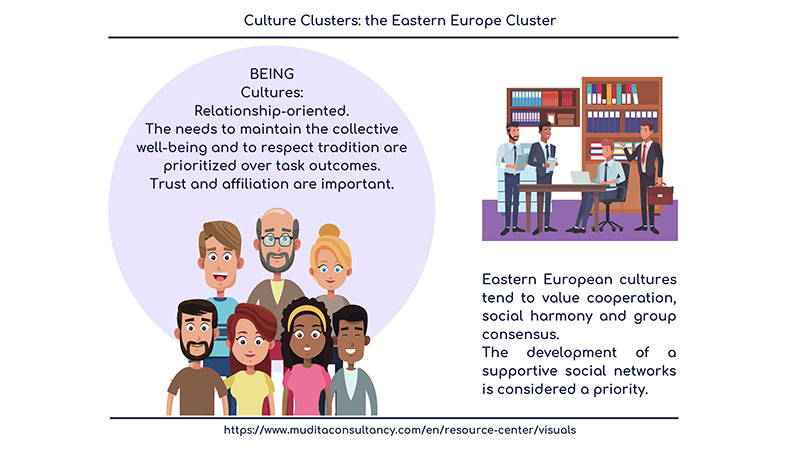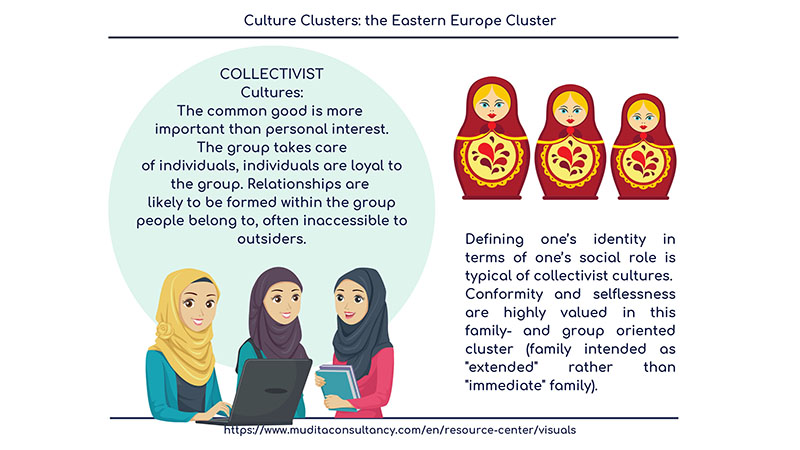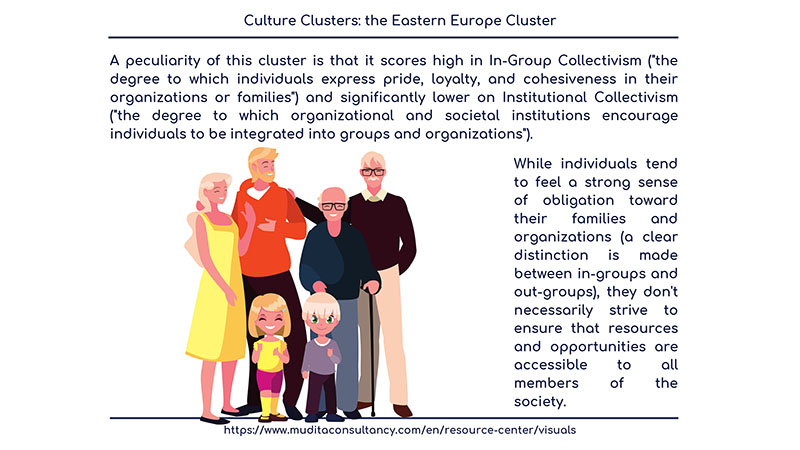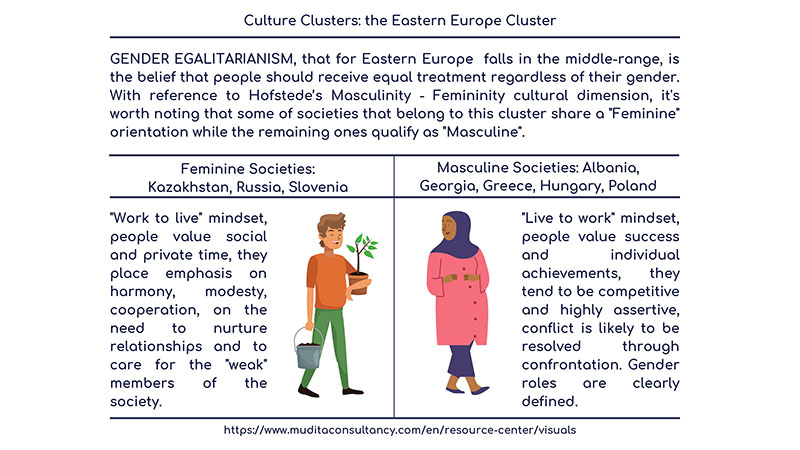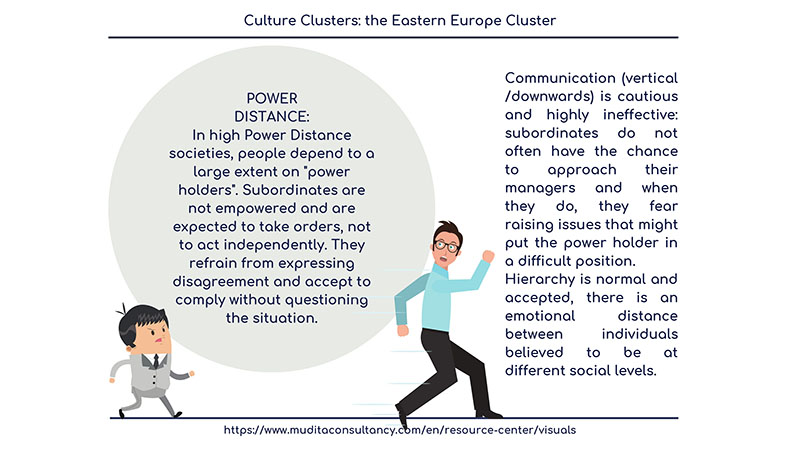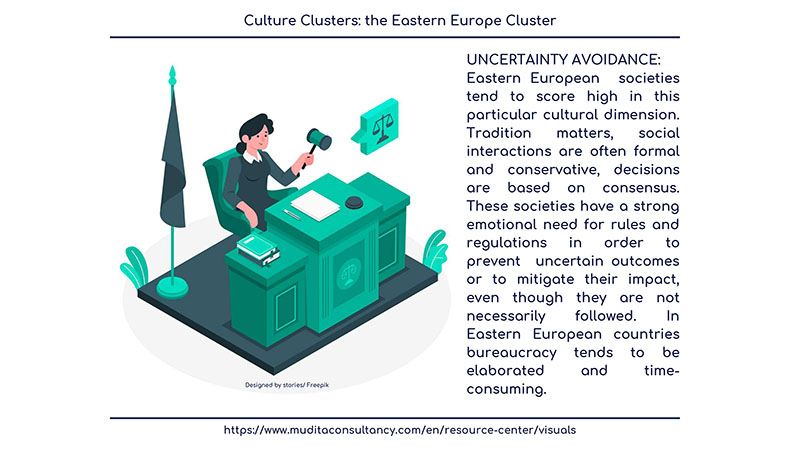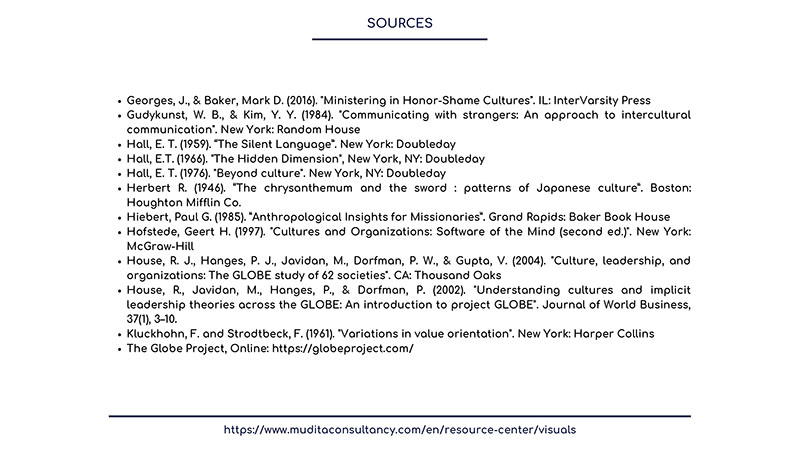The Eastern Europe Cluster
But they could neither of them persuade me, for there is nothing dearer to a man than his own country and his parents, and however splendid a home he may have in a foreign country, if it be far from father or mother, he does not care about it.
- Homer, The Odyssey -
Our latest addition to the Culture Clusters series takes us to Eastern Europe (Albania, Georgia, Greece, Hungary, Kazakhstan, Poland, Russia, Slovenia) and to its many contradictions.
Eastern European societies are defined by:
- a high-context communication style, that relies on contextual knowledge more than on explicit messages to transmit and share information;
- a polychronic approach to time management (time is seen as a repetition of natural cycles and patterns);
- high collectivism (note: as opposed to the Nordic Cluster, Eastern Europe scores high on In-Group Collectivism - also defined as “family collectivism”, the extent to which individuals identify with and prioritize the group they belong to - and low on Institutional Collectivism, “the degree to which organizational and societal institutions encourage individuals to be integrated into groups and organizations”);
- a being orientation (based on “moral relativism”, the idea that moral principles are culture-bound: being cultures tend to more more concerned with maintaining the collective harmony than they are with pursuing the “truth”);
- strong power dynamics, even though societies that belong to this cluster express a desire for a more even distribution of power and resources;
- a dislike for ambiguity and unpredictability (Uncertainty Avoidance. This cluster has wish for more rules and regulations to reduce the possibility of uncertain future outcomes).
In terms of gender egalitarianism - the belief that people should receive equal treatment regardless of their gender - Eastern Europe falls in the middle-range.
With reference to Hofstede’s Masculinity - Femininity cultural dimension, it's worth noting that some of societies that belong to this cluster share a "Feminine" orientation, while the remaining ones qualify as "Masculine" (mid-score):
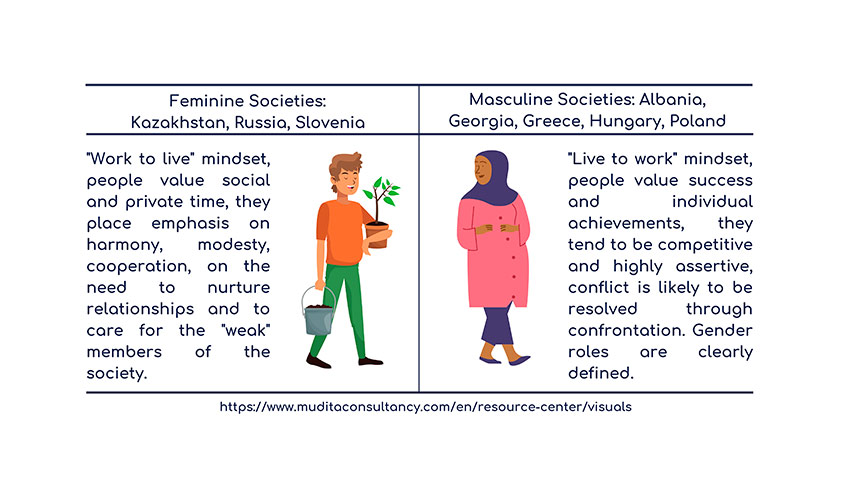
When it comes to leadership, the ideal leader in Eastern European societies appears to be charismatic and group-oriented. Autonomous leadership is appreciated, self-protective leadership (the self-conscious style that focuses on “face-saving”, on the safety and protection of the leader) is more tolerated than in other clusters.
***
Note: since there are significant differences among the countries that belong to this cluster, the specific cultural traits of Eastern European societies will be material for future posts and articles and we will not expand on them for the time being.
It’s worth mentioning that, according to the UN classification, Eastern European Countries are: Belarus, Bulgaria, the Czech Republic, Hungary, Moldova, Poland, Romania, Russia, Slovakia and Ukraine, while the Baltic States (Latvia, Estonia, Lithuania, that used to be part of the USSR) have been declared part of Northern Europe - together with Denmark, Finland, Iceland, Ireland, Norway, Sweden and the United Kingdom - since 2002 (*note: geographical and cultural classifications don’t always or necessarily overlap. From a cultural perspective, both Ireland and the UK are part of the Anglo-American cluster).
On a related note, I would recommend reading the following articles to gain some insight into the complicated “rebranding” of the "15 countries that rose from the ashes of the USSR” and into some of the prejudices and false beliefs that characterize the division between “east” and “west”:
A) “The Baltics: what's wrong with being 'east' anyway?”, by Polish journalist Agata Pyzik:
- “We even avoid the term “eastern” Europe as much as we can, preferring “central”;
- “The labels ‘new’ and ‘old’ may be patronising (Poland was included previously in the Guardian series ‘New Europe’), but they reveal a deeper sense of the rebranding eastern Europe went through after the fall of the Berlin wall in 1989. We were supposed to be reborn – but as somebody else. ‘New Europe’ was, after all, the phrase used by the former US defence secretary Donald Rumsfeld to describe the mainly ex-Bloc countries which supported the Iraq war”;
- “The desperation to be included into the rank of ‘normal European countries’ can be seen in the way all post-Soviet countries rushed to adopt capitalist, neoliberal economies, and sought inclusion in alliances such as Nato and European Union. This rush to the west is a fallout from the ancient divisions of the continent, which have led to the association of everything ‘west’ with civilisation and culture, and everything ‘east’ with barbarism.”;
- “There's always the construction of the ‘good west’ and the ‘bad east’, which is why correspondents always contrast the ‘beautiful’ Habsburgian Lviv and the ‘ugly’ Soviet Donetsk. The only country and society that doesn’t mind being portrayed as east is Russia – the historical powerhouse of the region; the ‘empire of the periphery’, as writer Boris Kagarlitsky puts it.”
B ) “Education in the Soviet Union Through the Eyes of an American Principal”, by former middle school teacher and current Urban Education PhD student at CUNY Tatiana Cozzarelli:
- "We may not agree with many or any of her social objectives, but we must acknowledge that her educational program is unusually significant.” With this remark, Lucy L.W. Wilson began New Schools of New Russia (1928), her report about Soviet education based on her observations in Russian schools.;
- "No matter what our conviction, we have to admit that the Bolsheviki are hammering out a startling new mechanism in the file of political control. Their experiment deserves scientific study, not hostile armies, intelligent criticism, not damning epithets”, Davis wrote.;
- "The Soviet principle of self-determination of nations was expressed in education. In fact, for women, schools had a double function: of education young leaders of both sexes, as well as allowing adult women to take up more societal tasks. Wilson says that the push toward universal preschool was viewed as a way to free women from, ‘the enslavement of household cares and as a means of including them in the social life of the country’ (Wilson 95).”
***
Related posts:
- The Sub-Saharan Africa Cluster
- The Middle East Cluster
- The Latin Europe Cluster
- The Germanic Europe Cluster
- The Nordic Cluster
- The Southern Asia Cluster
- The Confucian-Asia Cluster
- The Anglo Cluster
- The Latin America Cluster
***
SOURCES:
- House, R., Javidan, M., Hanges, P., & Dorfman, P. (2002). "Understanding cultures and implicit leadership theories across the GLOBE: An introduction to project GLOBE". Journal of World Business, 37(1), 3–10
- House, R. J., Hanges, P. J., Javidan, M., Dorfman, P. W., & Gupta, V. (2004). "Culture, leadership, and organizations: The GLOBE study of 62 societies". CA: Thousand Oaks
- Hall, E. T. (1959). “The Silent Language”. New York: Doubleday
- Hall, E.T. (1966). "The Hidden Dimension". New York: Doubleday
- Hall, E. T. (1976). "Beyond culture". New York, NY: Doubleday
- The Globe Project, Online: https://globeproject.com/
- Hofstede, Geert H. (1997). "Cultures and Organizations: Software of the Mind". New York: McGraw-Hill
- Herbert R. (1946). “The chrysanthemum and the sword: patterns of Japanese culture”. Boston : Houghton Mifflin Co.
- Kluckhohn, F. and Strodtbeck, F. (1961). "Variations in value orientation". New York: Harper Collins
- Gudykunst, W. B., & Kim, Y. Y. (1984). "Communicating with strangers: An approach to intercultural communication". New York: Random House
- Hiebert, Paul G. (1985). ”Anthropological Insights for Missionaries”. Grand Rapids: Baker Book House
- Georges, J., & Baker, Mark D. (2016). "Ministering in Honor-Shame Cultures". IL: InterVarsity Press
Disclosure: This post contains affiliate links. If you decided to buy any of the products listed here, I would earn a small commission (at no additional cost to you).
***
